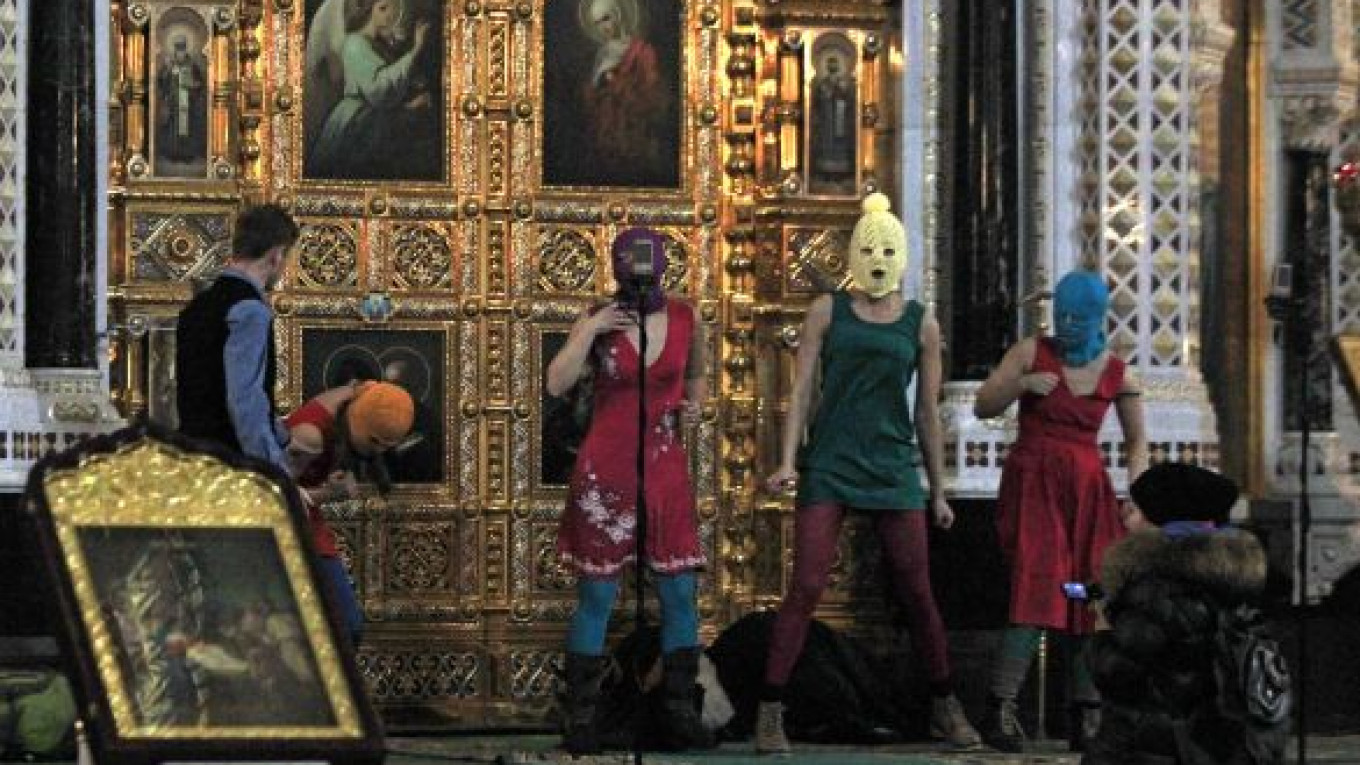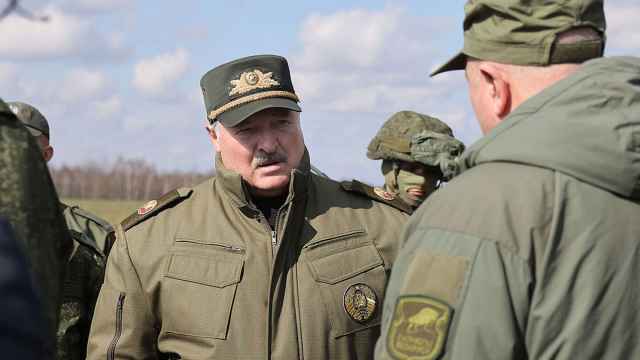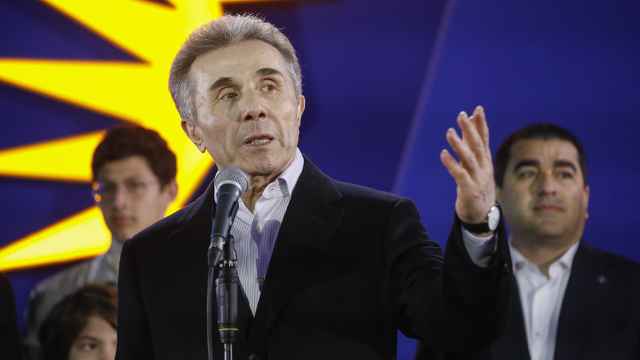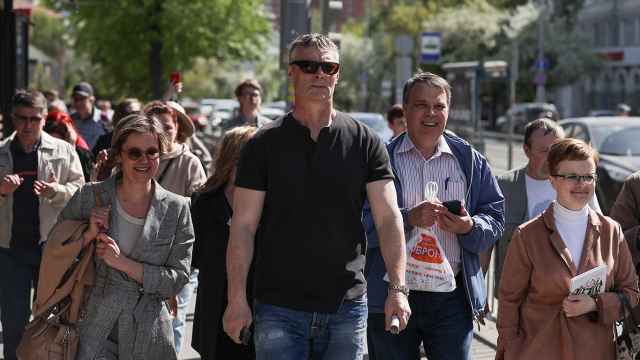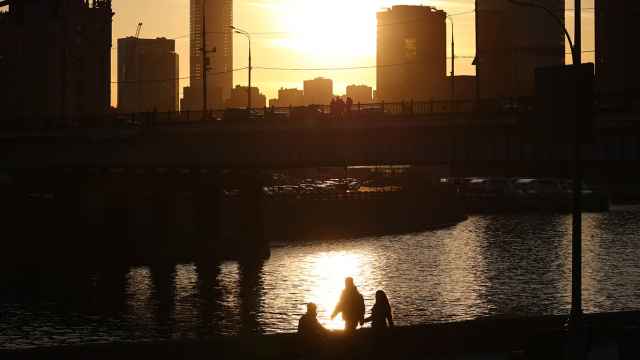A city court has declared Pussy Riot's “punk prayer” video extremist, meaning that media outlets can face closure for publishing the all-female band's famous performance in Moscow's Christ the Savior Cathedral.
Thursday's far-reaching decision also means that hosting platforms like YouTube must remove the video for Russian users and that national Internet providers will have to block access to sites that continue to carry the video.
It marks the second time that the country's notorious extremism law is used against a popular video, after a city court in October handed down a similar ruling against the U.S. film “Innocence of Muslims.”
Activists said the decision is part of a wider crackdown on the opposition and freedom of speech, although they noted that it would be difficult to enforce in practice.
The Zamoskvoretsky District Court on Thursday declared three other Pussy Riot videos, in addition to the "punk prayer" one, as extremist, news agencies reported.
The judge did not watch any of the videos and based her decision solely on a legal expertise ordered by prosecutors that said the videos represent a concealed call for mass disorder and might incite religious hatred, the RAPSI News agency reported.
The “punk prayer” performance, which took place in February, was the basis for which three band members were found guilty of inciting religious hatred.
Two of those members, Nadezhda Tolikonnikova and Maria Alyokhina, are currently serving two-year sentences in prison colonies. The third, Yekaterina Samutsevich, who was acquitted last month, said she would challenge the extremism decision.
But in a bizarre twist, court spokeswoman Yevgenia Pazukhina told RAPSI that this could only be done by the parties in the trial — the Justice Ministry and the prosecution. Samutsevich later filed a complaint against being denied being a trial party.
It was unclear, when and how the decision would be implemented. Channel One State TV even showed excerpts of it in its Thursday evening news broadcast.
Reports said it goes into force after the deadline for challenging it in a higher court expires. However, they differed in identifying the time frame from three days to more than a month. Channel One said it was 10 days.
The judge explicitly said sites carrying the videos would have to be blocked. However, the list of those sites and the court's reasoning will be published at an unspecified later date, RAPSI reported.
The most affected companies said it was too early to comment. A Google representative told Interfax that YouTube, a 100 percent subsidiary of the U.S. Internet giant, would wait for the decision to be published.
“To make a decision, YouTube needs a copy of the ruling with the videos' URL addresses,” the unspecified representative was quoted as saying.
LiveJournal spokeswoman Yekaterina Pakhomchik merely said the company had not received any demands from law enforcement authorities to block any content.
Pussy Riot published most of its past performances on the group's LiveJournal blog and its YouTube channel, where the “punk prayer” has been watched almost 2.4 million times.
The biggest eagerness to comply was displayed by the Rutube.ru hosting service, which on Thursday had blocked several videos with the catchword “Pussy Riot” — curiously including a Sept. 13 state television report in which Prime Minister Dmitry Medvedev criticized the band members' prison sentences as too harsh. Rutube.ru is owned by the state-controlled holding Gazprom-Media.
Experts said Thursday that while YouTube, LiveJournal and Internet providers had complied with similar court orders in the past, it would be difficult to remove the videos entirely.
A number of LiveJournal blogs listed on the Justice Ministry's official list of publications banned under the extremism law, are no longer online. The list, which as of Thursday had 1,539 entries, only contains a single YouTube video.
When users in Russia click on the song “Russky Marsh” by nationalist songwriter Alexander Kharchikov, they get a message that it is unavailable “due to a legal complaint.”
Experts have pointed out that while some big players might cooperate, it would be practically impossible to force all foreign hosting services to delete any given content, thus forcing authorities to demand that Internet providers block it.
While the blocking of specific content is possible through so-called deep packet inspection (DPI) filtering, employing this technology is expensive and cumbersome.
“It gives them a lot of work,” said Irina Borogan, a security analyst with the Agentura.ru think tank.
Experts also said regional Internet providers had blocked content before it appeared on the Justice Ministry's list and even before a court decisions. As an example they pointed to the “Innocence of Muslims” video, which has led to YouTube being entirely unavailable in Chechnya and Dagestan.
A recent Supreme Court decision has increased pressure on providers to block sites without direct state interference. The October ruling stipulates that they risk losing their licenses if they fail to block access to sites with illegal content.
The Federal Mass Media Inspection Service said Thursday that it would ask hosting companies to delete the videos after the ruling comes into force. “We want to take the initiative … so that Internet operators [providers] won't block access to innocent resources,” an unspecified spokesman told Interfax.
The agency runs a non-public blacklist of sites deemed harmful to children under a stringent law that came into effect on Nov. 1. Article 15 of the law also stipulates that the blacklist contains online content that has been declared illegal by courts. However, so far no site has been reported to be on the blacklist because of being extremist.
Adding to the confusion, the Federal Mass Media Inspection Service spokesman told Interfax that his agency would not deal with extremist content like the Pussy Riot videos.
Related articles:
A Message from The Moscow Times:
Dear readers,
We are facing unprecedented challenges. Russia's Prosecutor General's Office has designated The Moscow Times as an "undesirable" organization, criminalizing our work and putting our staff at risk of prosecution. This follows our earlier unjust labeling as a "foreign agent."
These actions are direct attempts to silence independent journalism in Russia. The authorities claim our work "discredits the decisions of the Russian leadership." We see things differently: we strive to provide accurate, unbiased reporting on Russia.
We, the journalists of The Moscow Times, refuse to be silenced. But to continue our work, we need your help.
Your support, no matter how small, makes a world of difference. If you can, please support us monthly starting from just $2. It's quick to set up, and every contribution makes a significant impact.
By supporting The Moscow Times, you're defending open, independent journalism in the face of repression. Thank you for standing with us.
Remind me later.



